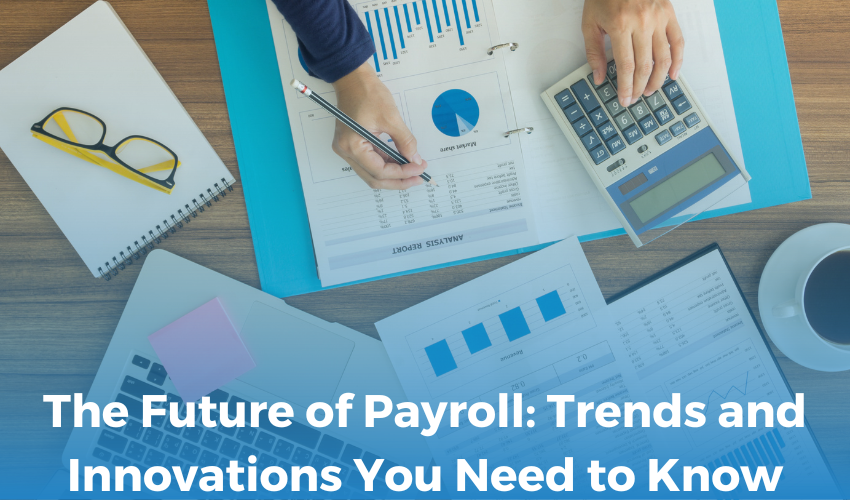

30-11-23
In the fast-evolving landscape of business and technology, every aspect of an organization is undergoing transformation, and payroll is no exception. The payroll future is not just about processing salaries; it's about embracing innovative technologies and trends that enhance efficiency, accuracy, and the overall employee experience. In this blog, we'll explore the emerging trends and innovations shaping the payroll management.
1. Automation and Artificial Intelligence:
One of the most significant trends in the payroll's future is the integration of automation and artificial intelligence. Automation streamlines repetitive tasks, such as data entry and calculations, reducing the likelihood of errors and freeing up valuable time for payroll professionals. AI, on the other hand, can provide insights into patterns and trends, helping businesses make informed decisions. Machine learning algorithms can analyze historical payroll data to predict future payroll needs accurately. The result is a more efficient and error-free payroll process, allowing HR teams to focus on strategic initiatives.
2. Blockchain for Payroll Security:
Security has always been a paramount concern in payroll processing. The advent of blockchain technology is set to revolutionize the security aspects of payroll. Blockchain, with its decentralized and tamper-resistant nature, ensures the integrity of payroll data. This technology can provide a secure and transparent platform for recording and verifying transactions, making it nearly impossible for unauthorized access or data manipulation. As concerns about data security continue to rise, the adoption of blockchain in payroll processing is likely to become a standard practice.
3. Cloud-Based Payroll Systems:
The future of payroll is undoubtedly in the cloud. Cloud-based payroll systems offer a myriad of benefits, including accessibility, scalability, and cost-efficiency. With employees working remotely or from different locations, cloud-based payroll solutions provide seamless access to payroll data, allowing for real-time updates and collaboration. Moreover, these systems are scalable, adapting to the changing needs of a growing business. By moving payroll to the cloud, organizations can reduce the burden of maintaining on-premise infrastructure, ultimately saving time and resources.
4. Employee Self-Service Portals:
Empowering employees with self-service portals is another emerging trend in the future of payroll. These portals allow employees to access their payroll information, view pay stubs, and make changes to personal details. By giving employees more control over their payroll information, organizations can enhance transparency and reduce the administrative burden on HR teams. This shift towards self-service not only improves efficiency but also contributes to a positive employee experience, promoting a sense of autonomy and ownership.
5. Gig Economy and Flexible Payroll Solutions:
The gig economy is reshaping the way people work, with more individuals opting for freelancing and short-term contracts. Traditional payroll systems are not always equipped to handle the dynamic nature of gig work. The future of payroll lies in flexible solutions that can adapt to the diverse payment structures of the gig economy. Businesses are exploring on-demand payroll options, allowing for instant payments or more frequent payroll cycles to accommodate the preferences of gig workers. This flexibility not only meets the needs of the evolving workforce but also positions organizations as attractive employers in the gig economy era.
6. Compliance and Regulatory Technology (RegTech):
Navigating the complex landscape of payroll compliance and regulations is a challenging task. The integration of regulatory technology (RegTech) in payroll processes can help organizations stay compliant with ever-changing laws and regulations. AI-powered tools can automatically monitor and update payroll systems to ensure adherence to local, state, and federal regulations. This not only mitigates the risk of non-compliance but also saves valuable time for payroll professionals, who would otherwise need to manually track regulatory changes.
7. Data analytics for informed decision-making:
Data analytics is becoming increasingly vital in payroll management reporting services in usa By leveraging advanced analytics tools, organizations can derive actionable insights from payroll data. These insights can inform strategic decision-making related to workforce management, budgeting, and resource allocation. For example, analyzing payroll data can help identify cost-saving opportunities, optimize staffing levels, and enhance overall operational efficiency. As the volume of data continues to grow, the ability to extract meaningful information from payroll data will be a key differentiator for businesses.
Conclusion
The future of payroll services is marked by a convergence of technological advancements and changing workforce dynamics. Automation, AI, blockchain, cloud computing, employee self-service, gig economy solutions, RegTech, and data analytics are all contributing to the evolution of payroll processes. As organizations embrace these trends and innovations, they are not only streamlining their payroll operations but also enhancing the overall employee experience and positioning themselves for success in the dynamic business landscape of the future. Payroll is no longer just about transactions; it's about leveraging technology to create a strategic advantage and drive organizational growth.
Tags :













































.jpg)
.jpg)
.jpg)
.jpg)


).jpg)














 Get A Quote
Get A Quote
Leave A Comment